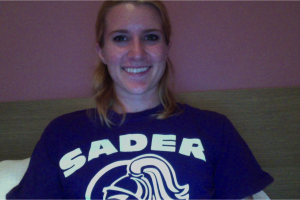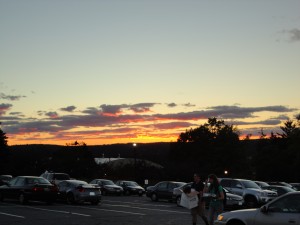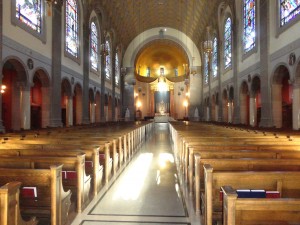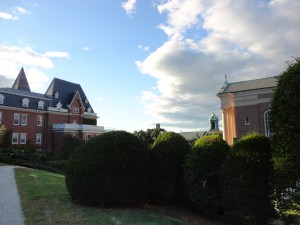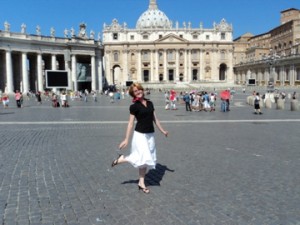I once described an Oxford term to a potential study abroad applicant as a finals period every week for eight weeks straight. Well, I can confirm that as a second year graduate student, it’s perhaps a bit worse than that. This term has been manic – between the degree (kiiiiind of important), DPhil applications, grant proposals, the dancing, the part-time job, and the MCR committee, I’ve been quite busy. But the good news is that the degree is going well – I’m now writing my first paper of the year on the differences in the Genesis poem as maintained in Junius 11 and Pal.Lat.1447 (which involved me learning Old Saxon – just another ancient language that no one else speaks…). I’ve also nearly completed my DPhil proposal, which is based heavily on a huge discovery that I made in the Bodleian at the beginning of the week (more on that later. Don’t worry, it’s not a huge discovery; I am not curing cancer or solving the world’s problems). This discovery also means that I might have to go to France to look at another manuscript – you know, it’s tough, but someone has to do it. Right?
Michaelmas Term
20 September
On 20 September, 2013, I will be awarded my Masters degree from Oxford University (well, that is if I pass).
Kind of scary? You bet.
Do I know where I’ll be after this degree? Not yet.
So, um, stay tuned!
Halfway There
Fifth week just started here – in five weeks, Michaelmas Term will be finished. That’s quite a frightening thought.
This term has been chaotic, to say the least. In addition to my studies, I’m still dancing, a member of the MCR committee, and I’m still a part-time waitress. So, life gets busy really quickly. But, every day, I’m in the Special Collections Reading Room with my manuscripts.
This year’s structure is a bit different from last year. Right now, I’m enrolled in two tutorials – one in Old English language, and one in Anglo-Saxon Paleography. The Paleography option will continue through next term, in addition to a new course instead of the Old English Language option. In the following term, I just have to write my dissertation. And then…well, I’ll graduate and be a Master of English, I guess!
In order to keep the professor dream going, I’m also in the middle of PhD/DPhil applications. This is bringing back quite a few memories from senior year when I did all of my Masters applications. It’s an exciting time; I’m hoping to stay at Oxford, but we’ll see what other options manifest in the next coming months.
So, until then, I’m off to translate some more!
Year 2
Well, here it is – today is the first day of the second year of grad school. Kind of a scary thought, isn’t it?
This year, my program of study is going to be a bit different than last year. Whereas I had set classes every week last year, I’ll just have a tutorial in Old English Language every week, and then a paleography tutorial every other week starting three weeks from now. Then, next term, I’ll trade out the Old English Language tutorial for one in Word and Image in Anglo-Saxon manuscripts. I have to write an article for every tutorial and take an exam for my Paleography class in Hilary Term (yeah, so Hilary Term is going to be fun again with two essays to write and an exam…just like last year). Last year, my classes were standard and adhered to a structure syllabus. This year, all of my tutorials are self-directed. I’ve met with my professors (just two guys between the three classes. Hope they like me!) to tell them about my personal research interests, and we’ve set up syllabi to compliment those personal interests. So, over the course of the next year, I won’t really be dealing with any texts that are past c.1300. I’ll pretty much be dealing with c.600-1100, which is awesome! My actual first classes aren’t until next week (next Wednesday, to be precise), but I’m already back in the libraries brushing up on Old English and Latin. It’s going to be an exciting – if albeit busy – term ahead.
The Vatican Grant
On Saturday, most of my friends were back at Holy Cross for Homecoming. And, man, did I want to be there. But, I celebrated Homecoming in my own special way. Saturday was my one day off in Rome, so I was able to just walk around the city. On Saturday, I found myself in the Church of St. Ignatius, and while I was there, I just reflected on the appropriateness of the situation. Without my experience at Holy Cross, I probably wouldn’t have found myself studying at the Biblioteca Apostolica Vaticana. In fact, during my stay at the BAV, I was able to consult the manuscript that started it all – the Libri Carolini, which you’ve heard of if you’ve read this blog since my sophomore year. Prof. Ellen Perry suggested that I research it for my research paper for her honors seminar, and that’s where everything just happened – I was fascinated by this book; the amount of detail that went in to making it a key grammatical treatise, the construction of it, the wide plans for its dissemination – everything just fascinated me. And on Monday, I actually held this eighth century book – the one that Theodulf of Orleans himself oversaw and Charlemagne could have very well touched – in my hands. That was really the most incredible experience of my time at the BAV. I was so fortunate that the BAV staff was so generous with letting me see such rare manuscripts during my stay there.
Okay, so enough reflecting (typical Holy Cross student over here – always reflecting). What was it really like? Well, when I finally got my library card and everything sorted (which was such a process anyway), the actual research was incredible. Here’s a breakdown:
7:30 a.m.: I woke up to the sounds of cars buzzing outside my hotel (http://www.lacupolabedandbreakfast.com/, which I would highly recommend to anyone), and started my day with a shower and breakfast of espresso and coffee cakes. I brought the latter, since I knew I wanted to spend my food money on nicer dinners instead – yay frugal graduate student living! The hotel provided the espresso, and I have to say it – as much as I love tea, I really learned to appreciate espressos on this trip. (Also, you can find espressos at bars (which are our cafes) for about 0,85 euros if you stand at the bar, like the Italians do.) After a brief review of the manuscripts I wanted to consult (the hotel had free wifi – win!), I headed off on my ten minute walk to the Vatican.
8:35: Arrive at the Vatican. I got to walk through the Sant Anna Gate, which is right before you hit the colonnade of St. Peter’s Basilica.
I walked through the first level of security – a Swiss Guard checking my ID – and then continued on the road, which was usually teeming with priests and nuns. Then I walked through the next level of security – a police officer checking my ID – as I entered the courtyard of the Belvedere Palace.
The entrance to the Belvedere Palace, complete with some nuns.
Inside the courtyard of the Belvedere Palace
The Biblioteca Apostolica Vaticana!
8:45: Opening time at the library. Upon entry, I handed over my card to the security guard, who checked me in. Then, I proceeded to the locker room, since bags are not allowed in the library. You have to hold your card to the reader, which unlocks a locker for you. After that, I entered through a a card reader entry, and then proceeded up three flights of stairs to the library. There are three rooms to the library – the actual library, the manuscript consultation room, and the manuscript library room. You have to have special access to the manuscript consultation room, which I did, and that’s where I spent all of my time. Upon entering the room, I had to hand over my card again to the librarians, who checked me into the reading room, and I had to sign in as well and take my assigned seat for the day. If I had kept a manuscript on the shelves, I could pick it up, but due to my constricted time, I was working quickly through all of my manuscripts to see as many as possible. So, I then requested my manuscripts for the day, since all manuscripts have to be requested before noon.
10:00: Usually, this was the first delivery of manuscripts of the day. Some days (Friday and Monday), I had to wait a bit longer, since I was working with special codices, but usually I had at least one manuscript available within the first delivery. Although you can call up three manuscripts in the morning, you can only have one at your desk, so the other two needed to stay at the librarians’ desk. I would take back my manuscript to my desk, and begin to work with it.
1:00: Lunch time! Unlike some other libraries in Italy, the BAV doesn’t close for a two hour lunch, which is awesome. You could potentially just work through the day. But, I like food. You have to be checked in and out of the library every time you want to leave (even if it’s to go to the bathroom), so I would hop up and explain that I was coming back and to hold my manuscripts, please. Then I would dash back to the hotel, which was equipped with a mini-fridge. That was awesome, since I ended up saving so much money on lunches. On the first day that I was in Rome, I just headed over to a market to pick up some crostini, cheese, and fruit for the week. However, did you know that you’re supposed to weigh your fruit and then print out a barcode for it? Yeah, I didn’t know that. I like the system since it’s so efficient, but it really only works if you know about it. Anyway, quick lunch with some espresso, and head back to the Vatican.
2:00: Back at work.
5:00: The BAV shuts down at 5:15, so I usually started to return my manuscripts, check out of the manuscript room, pack up my locker, and check out of the library by 5:00. After a brief stop at Fatamorgana Gelateria (seriously, I have never had better gelato. The pistachio and passion fruit were amazing), I headed back to the hotel to drop off my work stuff and change into some cooler clothes for the night. See, Italian Cathedral Libraries have modesty rules, which is absolutely fine. But when it’s really hot out (like it was this past week in Rome), the last thing you want to do is continue wearing your skinny jeans and button down shirt. After that, I’d head out for some walks around Rome.
8:00: The Italians eat very late. Even by showing up at 8:00, I was still early. But hey – when you’ve only had some coffee cakes, toast, cheese, and fruit all day (oh. And some gelato…), you get hungry, and you can’t hold out until the more acceptable 8:30 dining hour. Italian dinners also take a while – usually they clock in a 2 hours. Can you tell why I love Italy?! I stayed on the Prati side of the Tiber for my dinners, since I kind of didn’t want to be wandering around Rome by myself at night. And I’m glad I did, since the Prati area tends to be more local and less touristy than other sections of Rome (when you get away from the immediate Vatican area, that is). I didn’t have a bad meal in the Prati area at all. Of course, the locals were a bit shocked when I asked for a table for one, but they got used to it and my journaling or reading habits at dinner.
10:30-11:00: Walk home to the hotel, and stop to see some sights along the way.
And then, repeat!
Working in the Vatican was a dream. I was granted access to so many reserved manuscripts. It was really such a surreal experience. Hopefully I’ll be able to continue my research there, since I had to rush through a bit of my manuscript consultation.
Sader Italiano
No idea if my Italian is anywhere near correct. I’m going to assume that it’s not.
But, I am officially in Rome and registered and everything with the Vatican Library. Details on that to follow, of course. And, even though I have to miss Holy Cross’ Homecoming this weekend, at least I’m still representing the Saders in Italy.
Role Reversal
Well, after a brief week and a day visit to Atlanta and Boston, I am back in England. Yes, that’s a lot of traveling in a very short time, and, yes, I am looking forward to my bed. This trip was a bit discombobulated due to the Rome grant (first world problems, I know). I intended to spend about two weeks in Atlanta, and the weekend of 20-22 September in Boston, since that’s Holy Cross’ homecoming. However, the Vatican gave me a few dates during which I could visit, and Mom ‘requested’ that I visit home before Christmas. Thus why I was in America for a whopping 8 days.
The main reason why I returned to America (in addition to the entire thing that it’s home) was because I was invited to speak about my research at Holy Cross. Holy Cross created a new club – Manuscripts, Inscriptions, and Documents Club – the year after I left. Yeah, I’m not happy about my timing. But it’s also so wonderful that these undergraduate students have such an incredible opportunity to start working in codicology at a younger age. I spoke about the subject of my dissertation – word and image in Junius 11. The club is oriented towards Classical paleography and codicology, which meant I had to tailor my presentation just a bit.
The actual event was quite a surreal experience. I was lecturing in the same room in which Ellen Perry, a professor of Classics, once instructed me. Her class, The Ideological Destruction of Art, is really where my love of manuscripts started (and, actually, word and image as well). There’s also a bit of an inside joke on Fenwick 4 that I used to look exactly like a younger version of Ellen Perry when I had shorter hair. My presentation was very well received, and some of the kids (who are like two years younger than me…) had some really interesting questions about my research. They then presented what they’ve been researching, and it was just so cool to see undergrads so invested in paleography. Hopefully a few of them will be inspired to continue in the field for graduate school. Or maybe they saw how tired I was and decided to not inflict this pain on themselves. I don’t know – we’ll see, I guess. So this was my first professional lecture. It was an absolutely incredible experience, and I’m glad that it was back at my beloved alma mater. It was also great to go back to Holy Cross. When I visited last year, I was still in that state of denial, and I just desperately wanted to go back. This time, I was able to enjoy being back on campus without this nagging feeling of “TAKE ME BACK I BELONG HERE”, if you catch my drift. I caught up with a few professors and some friends (I even crashed the ballroom dance practice), and I was able to take some personal time to see Fr. Brooks’ grave and St. Joe’s.
The trip to Holy Cross came at a really fitting time. I discovered my love of manuscripts in Fenwick 413 with the help of Professor Perry nearly four years ago, when I researched the Libri Carolini for her honors seminar. Four years later, I returned to give a presentation just a few weeks before I head off to Rome to see some select manuscripts for my work in word and image in Anglo-Saxon manuscripts, including (hopefully!) the Libri Carolini. I can’t imagine telling my freshman year self the many changes that my life plan would undergo in a mere four years. From law school to manuscript curator, my dream career has changed considerably. Giving the presentation at Holy Cross was so surreal because everything just came full circle. There’s honestly not a day of my graduate career that I don’t use something that I learned from Holy Cross (well, when you’re a medievalist and you took a majority of English, Classics, Theology, and Philosophy classes, that’s kind of bound to happen). And I guess that’s why I was so excited to give this presentation – it was a way in which I could thank those professors responsible for giving me that very foundation, and it was also a way to show current students exactly what you can do with a degree in Classics or English.
Five Years
Five years ago, my family packed up my bags and we headed off to Worcester.
Five years ago, we got stuck in immense traffic coming off of the Cape. And then again right outside of Franklin, MA (I remember this only because we stopped at a Dunkin’ Donuts).
Five years ago, I arrived on campus at 1 o’clock, and my family scrambled to move me in and set me up…in three hours.
Five years ago, I attended the Mass of the Holy Spirit with my family, and left without them.
Five years ago, I cried. Hard.
Four years later, on May 27, 2011, I cried again – sobbed, more like it – as I left Holy Cross. Tears seem to serve as the bookends of my collegiate career. I came to Holy Cross not knowing another soul and fearful to leave my family. I left four years later with more friends than I can count and a new family.
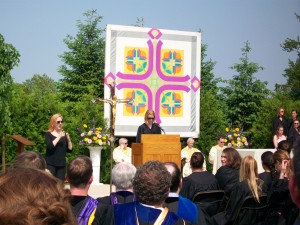
So, to the Class of 2016 – welcome to the Crusader family, and may your four years be filled with laughs, tears, late nights, essay crises, football games, basketball games, treks into Boston, and, most importantly, Culpepper’s iced coffee.
The Eternal City
I first visited Rome in 2004 with a group of high school students on a cultural exchange trip. When we arrived at the Trevi Fountain, my tour guide informed us that it’s a tradition to throw in a coin, which guarantees that you’ll see Rome again. If you throw in two, you’ll supposedly meet the love of your life in Rome, and if you throw in three, you’ll live in Rome for forever. Being the Classics nerd that I am, I wasn’t taking any chances that day, and I threw in about fifteen.
The coins seem to have worked so far; I returned to Rome with my sister in 2010 shortly before I returned to Holy Cross for my senior year.
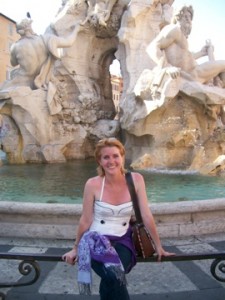 That trip was filled mostly with me running around Rome and dragging my sister to all of the awesome nerdy sites. No worries; Caitie survived, but I don’t think she’ll travel with me in the near future.
That trip was filled mostly with me running around Rome and dragging my sister to all of the awesome nerdy sites. No worries; Caitie survived, but I don’t think she’ll travel with me in the near future.
I’m happy to report that the coins seem to still be working. Last week, I found out that I received a grant from both the Vatican and Bodleian Libraries to spend a week in the Vatican Library. I’ll be working with two manuscripts that factor into the matrix of my current research interest, Junius 11. I’ll be leaving at the end of September, which unfortunately means that I’ll have to miss Holy Cross’ Homecoming. But, hey – a week with my manuscripts in Rome? I think I can handle it. I’m really excited about this opportunity, since this is essentially a gateway grant to further grants at other libraries. And, who knows? Maybe I’ll discover something particularly rare in the dusty archives.
All I can say is maybe I should’ve thrown in thirty coins or so.
Yes, this is where I’ll be working. I might not come back…
Colleen Curran, MSt?
So, technically, I am a Master of English (MSt). Since I’m in the two year MPhil program, however, I still have another year to go. But I could technically leave Oxford now as an MSt, which is a beyond frightening thought for the rest of academia.
With all of the infinite wisdom that I have gained from my first year in graduate school, I surely must be more informed and knowledgable about my subject. Well, in a way, that’s certainly the case. But you know Socrates’ infamous quote, ‘I realize now that I know nothing’? Yes. That’s how I feel a bit. What’s great about my program is that all sixteen of the students approached the general strand of 650-1500 with such different ideas and expectations. As you all know, I’m all about the manuscripts, and the earlier, the better. But I encountered people who were more focused on dialect, sociological factors, and unique literary instances. I met some classmates who declared that they hated working with manuscripts (which is anathema to me), and others who thought that Middle English was enough of a foreign language and French was more important than Old English. The different perspectives with which all of my classmates have challenged me to approach the same material has been so rewarding.
Here’s the other thing about graduate school. In undergraduate, I feel that professors are looking more for effort. Did you come up with an original research topic? Did you make valid, intelligent points? Can you back up your claims with research? Wonderful. I won’t lie – I wrote a paper or two (or three…) the night before they were due, and I got A’s. My argument was always clear and they were ‘good’ papers, don’t get me wrong. But, in essence, they were just foundation papers. And here’s where graduate school is different – effort is great. But it is not going to get you the highest mark. I find that graduate school looks more for publication possibility. Every last stone has to be turned, and every idea has to be cooked through and completely syncretized. Now, this is not a bad thing at all. I’ve suffered from perhaps not developing my ideas enough in my undergraduate career, and my graduate career is really ironing those kinks out of me. Every sentence, phrase, and word matters. It’s like applying literary theory to your own essays, which is quite the surreal experience. My undergraduate career prepared me wonderfully to think about a myriad of topics in a very wide range, and now my graduate career requires me to look deeper into more specific issues, and how to engage with prior research – how is what I’m doing novel or important to my field? – and potentially challenge previously held notions regarding what I study. Overall, it’s been a completely whirlwind of an academic year. I can honestly say that I don’t think I’ve ever learned this much in a mere nine months. I think the highlight of my academic year here has been accessing a manuscript at a college here, transcribing and translating the text, and then writing an argument about that same text and how the codicological aspects factor into the presentation and interpretation of that same text. Talk about a head to toe treatment. But this is what I want to do, and this immediate contact with manuscripts really fuels my passion for the period and, as cheesy as it sounds, continues to inspire me about my research on a daily basis. To be able to hold and analyze the very same book that someone wrote and read nearly 1,000 years ago is just a stunning experience. Being able to then interpet that same text within a modern setting is just even more stunning.
If anything, this year – despite the sleepless nights, the insane reading lists, and the endless cups of tea – has reasserted the fact that this is my passion, and that this is what I want to do with the rest of my life. I realize how lucky I am that I can be so young and just know that this is sincerely what I want to do. I mean, maybe I’ll have a midlife crisis at the age of 27 and realize that affording groceries would be nice. But, at the moment, I’m incredibly happy with what I do, and I can’t wait to see what next year’s academic experiences bring.











